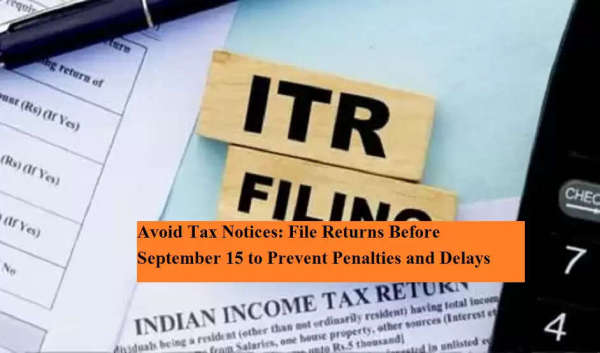
Filing income tax returns on time is one of the most crucial responsibilities of every taxpayer. With the September 15 deadline approaching, experts are urging individuals to be cautious while filing their returns. Rushing the process may lead to errors, which could later invite penalties or delays in refunds.
The Income Tax Department has set September 15 as the cut-off date for filing certain types of tax returns. Missing this deadline could result in monetary penalties as well as complications in processing. More importantly, failing to comply with timelines may trigger notices from the tax department, creating unnecessary stress for taxpayers.
Tax professionals highlight that many individuals wait until the last few days to complete the filing process. In this rush, they often overlook important details such as:
Reporting all sources of income correctly
Claiming deductions under the right sections
Entering bank account details for refunds
Cross-verifying tax credits with Form 26AS
Even small mistakes can result in discrepancies, leading to scrutiny or notices. In some cases, taxpayers may also lose out on eligible deductions simply because of careless filing.
If returns are not filed by September 15, taxpayers may face:
Late fee penalty under Section 234F of the Income Tax Act
Interest charges on the pending tax amount
Delay in receiving refunds, which can impact financial planning
For salaried employees, professionals, and small business owners, these penalties can add up to a significant amount. Filing on time not only avoids extra costs but also ensures a clean financial record.
To avoid mistakes and penalties, experts recommend a systematic approach:
Gather all documents – Collect Form 16, bank statements, investment proofs, and TDS certificates.
Cross-check Form 26AS – Verify that all TDS deductions are accurately reflected.
Use official portals – File through the Income Tax e-filing website or authorized intermediaries.
Avoid last-minute rush – File at least a few days before the deadline to prevent server issues.
Seek professional help if needed – Consulting a tax advisor reduces the chances of errors.
One of the major drawbacks of delayed filing is the postponement of tax refunds. Many taxpayers rely on refunds for meeting their financial goals. If returns are filed late or contain errors, the refund process slows down, sometimes taking several months. Filing before September 15 ensures faster refund processing and timely credit to your bank account.
Chartered accountants and tax consultants emphasize that compliance is not just about avoiding penalties—it also builds credibility with financial institutions. For example, banks and lenders often review tax returns when approving loans or credit cards. A clean tax record helps in securing approvals quickly.
With the September 15 deadline just around the corner, taxpayers should act without delay. Filing returns on time, with accuracy and proper documentation, protects you from penalties, ensures timely refunds, and keeps your financial records strong. Instead of waiting until the last day, prepare and file now to enjoy a hassle-free tax season.